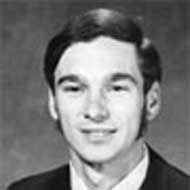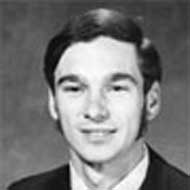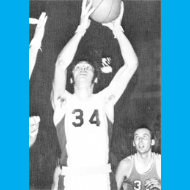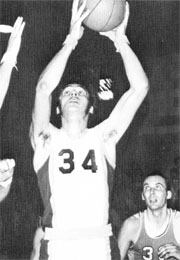Bruce Joseph Masopust g72
When junior college transfer Bruce Joseph Masopust arrived from Cicero, Illinois to play basketball at Fort Wayne Bible College (FWBC) in the fall of 1969, few could have imagined how dramatically a program that had been a perennial doormat would improve over the next three years. Bruce helped bring about that transformation, one built on tough conditioning, aggressive defense, ruthless rebounding, a disciplined offense, and selfless team-play. Bruce excelled in each facet of this new approach to the game, especially defense and rebounding. As one young sportswriter quipped, "Bruce grabs every rebound that comes his way, and most that don't."
His first year (1969-1970), a team with eight players (injuries could reduce the number to six) and little experience surprised the campus with a winning season (13-12), only the second in history against varsity competition, and a North Central Christian Athletic Conference (NCCAC) Western Division Co-Championship. The Falcons still did not have a home gym, but they had a competitive team, one that destroyed a strong Grand Rapids Baptist squad 107-84. Bruce set rebounding records for a game (26) and a season (387) with a 15.5 per game average. He also led the team in scoring with 511 points, a 20.4 per game average. He made Fort Wayne All-City first team and NCCAC second team.
His second year (1970-1971), the squad again began with just eight players, but the team kept improving. With 427 points, a 15.8 per game average, Bruce now trailed Pete Strubhar in scoring; but there was never any doubt as to who controlled the boards. Bruce pulled down 490 for a staggering18.1 per game average; both new season records, as well as a new single game record of 33. By now, he also held the career rebounding record after just two seasons with 877. The team, which finished 19-8, repeated as NCCAC divisional co-champions, won the NCCAC tournament, and overwhelmed a highly favored Bethel College squad in the National Christian College Athletic Association (NCCAA) District 3 championship game to land a spot in the NCCAA national tournament, where they gave perennial champion Azusa Pacific a tough battle. Bruce made second team All-City and Outstanding College Athletes of America.
Bruce delayed surgery and fought multiple, nagging injuries all the way through an outstanding senior season (1971-1972), scoring 374 points (14.3 per game average), while setting a single season field goal shooting percentage (60%). So he finished with 1,312 career points, second on the list at that time, and with a career field goal percentage of 51.3%. By hauling in another 394 rebounds (15.1 per game average) Bruce accumulated a career record 1,271 rebounds in just three years for an astounding 16.3 rebounds per game career average, the latter still a campus standard-to go along with a new game record of 36 rebounds (his fourth game rebounding record). Bruce had also led the team for three years in charges taken. Bruce was named co-MVP of the Falcon Invitational Tournament, to the first team All-City squad, and to the NCCAC All-Tournament team. The whole team (21-5), which had gone on an amazing 26-3 run, starting from the previous February, stumbled down the stretch when they lost their fine point guard with eight games to go. They closed with a heartbreaking two point loss in the NCCAA District 3 championship game, despite a great final effort from Bruce that carried them right up to the buzzer.
Bruce also played three years of hard-nosed varsity baseball for the Falcons.
After graduation, with a degree in Christian Education, Bruce toured the Orient that summer (1972) and the next (1973) with Sports Ambassadors/Venture for Victory. Legendary Taylor University and Venture for Victory Coach Don Odle would call Bruce the greatest rebounder he had ever seen on any level.
Bruce returned to FWBC to help as an assistant coach for the 1972-1973 season and helped direct the team to a new record for wins (23-6); as well as Bethel Invitational (now Gates Automotive Classic), Falcon Invitational, NCCAC tournaments and NCCAC championships. During that same year, he served as Executive Director of Help A Kid, an inner city camping ministry.
When Overseas Crusades asked Bruce and his new wife Linda Roath (FWBC 1974) to go to Tasmania, Australia to coach and establish a basketball league for local churches, a four month assignment quickly became a year-long appointment.
Bruce next became the visitation pastor at Cedar Road Missionary Church in Osceola, Indiana (1975-1976), and then the youth pastor at Calvary Baptist Church in Muscatine, Iowa (1976-1984).
There followed a year managing a Christian camp in Colorado, which prepared Bruce for leadership of Pine Trail (Baptist) Camp in Saugatuck, Michigan, which he directed until 1999.
In more recent years, Bruce has worked as a road test examiner, but remains active in Immanuel Church, in Holland, Michigan, where he and Linda are long-time members.
Bruce continues in competitive athletics as injuries allow, and in 2007 was captain of the famed Douglas Dutchers Vintage Baseball club.
Bruce and Linda are parents of Brian and Beth.






